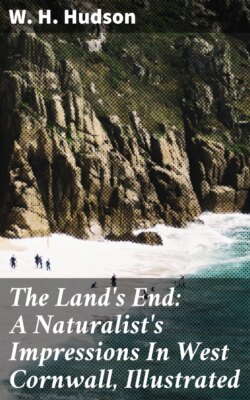Читать книгу The Land's End: A Naturalist's Impressions In West Cornwall, Illustrated - W. H. Hudson - Страница 12
На сайте Литреса книга снята с продажи.
Original
ОглавлениеFrom all this it might appear that the gulls at St. Ives are having an exceedingly good time, but they are not wholly happy—not happy every day, as they very soon let me know. The fishermen, like the Cornish people generally, are strict Sabbatarians, and from Friday night or Saturday morning, when the boats come in, they do not go out again until the following Monday evening. In a neighbouring fishing village the boats are taken out at the stroke of twelve on Sunday night. The St. Ives men do not like to run it so fine, and the gulls are never able to understand this long break in the fishing. On the Saturday, after feeding, they retire to the sea and the rocks, where they pass the day comfortably enough, sitting with beaks to the wind and digesting a plentiful meal. On Sunday morning they congregate in the harbour with empty stomachs only to find the boats lying empty and idle and all the men away; they do not like it, but they put up with it, and by and by loiter off to pick up what they can for themselves, or to wait patiently on the sea and the rocks, through another long twenty-four hours. On Monday morning they are very hungry indeed, and come in with stomachs that scream for food. They come in their thousands, and still nothing for them—the boats lying empty and idle, the men still at home in bed and no movement in the harbour! They cannot and they will not endure it. Then begins a tremendous demonstration of the unemployed. On my first Monday I was roused from slumber before daylight by the uproar. It was not now that tempest and tangle of broken, squealing and grinding metallic noises emitted by the big gulls when they are in numbers fighting over their food, it was the loud long wailing call of the bird, incessantly repeated, a thousand wailing like one, and at intervals the dreary laughter-like chorus of short reiterated cries; then again the insistent wailing calls. When it became light they could be seen as a white cloud hanging over the harbour, the birds moving round and round over the idle boats in endless procession, and this went on for about an hour, when, finding that nothing came of it all, they went sadly away.
On yet another morning I was awakened before daylight, but this was a happy occasion, the boats having come in during the small hours laden with the biggest catch of the season. The noise of the birds made me get up and dress in a hurry to go and find out what it was all about. For an hour and a half I stood at the end of the little stone pier watching the cloud and whirlwind of vociferous birds, and should have remained longer but for a singular accident—a little gull tragedy—which brought a sudden end to the feast. The men in fifty boats while occupied in disengaging the fish from the nets were continually throwing the small useless fishes away, and these, falling all round in the water, brought down a perpetual rush and rain of gulls from overhead; everywhere they were frantically struggling on the water, while every bird rising with a fish in his beak was instantly swooped down upon and chased by the others. Now one of the excited birds while rushing down by chance struck a rope or spar and fell into the water at the side of a boat, about forty yards from where I was standing. It was a herring gull in mature plumage, and its wing was broken. The bird could not understand this; it made frantic efforts to rise, but the whole force exerted being in one wing merely caused it to spin rapidly round and round. These struggles eventually caused the shattered bone to break through the skin; the blood began to flow and redden the plumage on one side. This was again and again washed off in the succeeding struggles to rise, but every time a pause came the feathers were reddened afresh. At length the poor thing became convinced that it could no longer fly, that it could only swim, and at once ceasing to struggle it swam away from the boats and out towards the open bay. Hardly had it gone a dozen yards from the boat-side where it had fallen before some of the gulls flying near observed it for the first time, and dropping to within three or four yards of the surface hovered over it. Then a strange thing happened. Instantly, as if a shot had been fired to silence them, the uproar in the harbour ceased; the hundreds of gulls fighting on the water rose up simultaneously to join the cloud of birds above, and the whole concourse moved silently away in one direction, forming a dense crowd above the wounded bird. In this formation, suspended at a height of about thirty yards over and moving with him, they travelled slowly out into the middle of the bay.
The silence and stillness in the harbour seemed strange after that tempest of noise and motion, for not a bird had remained behind, nor did one return for at least half an hour; then in small companies they began to straggle back to resume the interrupted feast.
